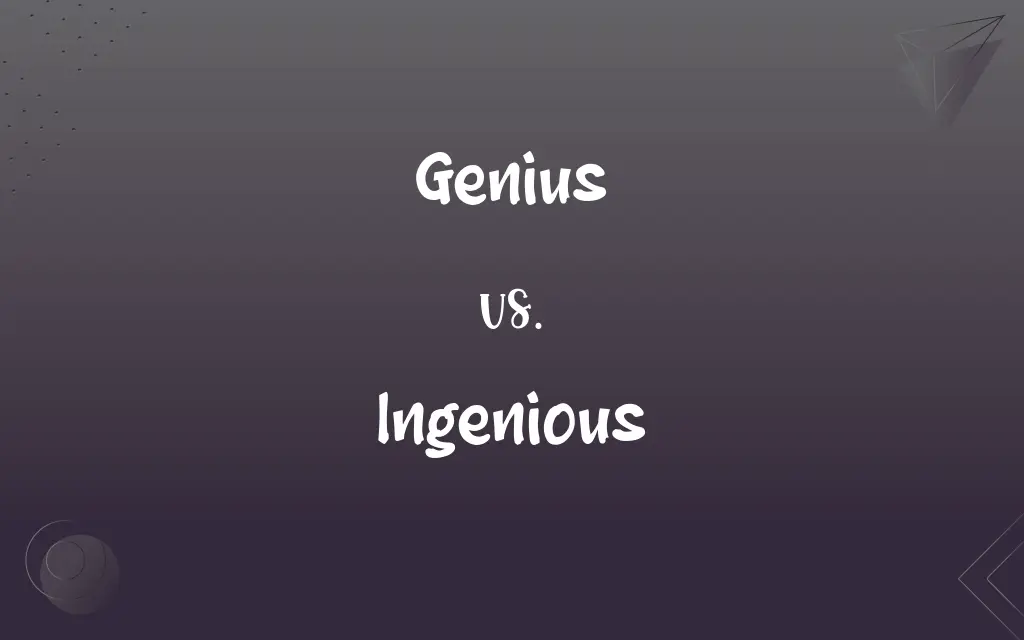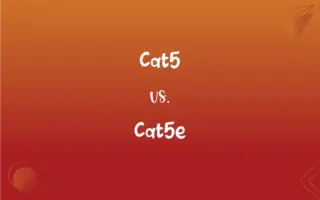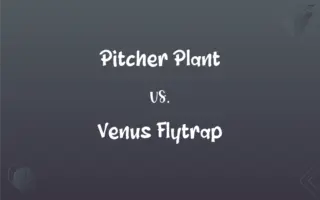Genius vs. Ingenious: What's the Difference?
Edited by Harlon Moss || By Janet White || Published on January 10, 2024
Genius refers to exceptional intellectual or creative power or other natural ability. Ingenious describes someone or something that is clever, original, and inventive.

Key Differences
Genius is often used to describe a person with extraordinary intellectual or creative prowess, often evident from an early age. Ingenious, on the other hand, is an adjective describing cleverness or originality in problem-solving or design.
The term genius can apply to a wide range of fields, including science, art, and literature, indicating a deep, natural aptitude. Ingenious is more about the quality of ideas or creations, implying innovation and creative thinking.
A genius might be recognized for their profound insights or groundbreaking work, often changing the course of their field. An ingenious solution or invention, however, is admired for its creativity and effectiveness in addressing specific problems.
Genius is often inherent, suggesting a certain level of inborn talent or intellect. Ingenious, conversely, relates to the application of intelligence and creativity to produce something novel or to solve problems ingeniously.
A genius is a person with exceptional talent, while an ingenious person might not necessarily be a genius but is still capable of producing exceptionally clever and effective ideas or products.
ADVERTISEMENT
Comparison Chart
Part of Speech
Noun
Adjective
Meaning
Exceptional intellectual or creative ability or person with such ability.
Displaying creativity or cleverness, particularly in design or problem-solving.
Usage in Sentence
Describes a person or their ability.
Describes an idea, solution, or creation.
Field Association
Often associated with overall intelligence or talent in a wide range of fields.
Primarily associated with creativity and problem-solving in specific contexts.
Typical Context
Used to signify an inherent ability or a person with such ability.
Used to describe the quality or nature of an idea or solution.
ADVERTISEMENT
Example
"Einstein was a genius in theoretical physics."
"The ingenious design of the device made it very efficient."
Genius and Ingenious Definitions
Genius
Person with high IQ.
She was recognized as a genius after scoring exceptionally high on an IQ test.
Ingenious
Clever and original.
Her ingenious solution simplified the complex problem.
Genius
Exceptional intellectual ability.
The young mathematician was considered a genius in algebra.
Ingenious
Resourcefully inventive.
He was ingenious in repurposing everyday objects.
Genius
Innovative thinker in a field.
Einstein was a genius in theoretical physics.
Ingenious
Skillfully inventive.
The engineer's ingenious approach saved time and money.
Genius
Natural talent in a specific area.
Mozart was a genius in music composition.
Ingenious
Inventive and effective.
The ingenious design of the gadget won several awards.
Genius
Creative mastermind.
His novel's plot twist was pure genius.
Ingenious
Creatively brilliant.
The artist's ingenious use of colors captivated everyone.
Genius
Extraordinary intellectual and creative power
Artistic works of genius.
Ingenious
Having great inventive skill and imagination
An ingenious negotiator.
Genius
A person of extraordinary intellect and talent.
Ingenious
Marked by or exhibiting originality or inventiveness
An ingenious solution to the problem.
FAQs
Is genius limited to academics?
No, it can be in various fields like art, science, etc.
What defines a genius?
A person with exceptional intellectual or creative power.
How is ingenious different from smart?
Ingenious implies creative problem-solving, while smart implies general intelligence.
Can a child be a genius?
Yes, some children show genius traits early on.
Can genius be learned?
Genius is typically seen as an inherent quality, though skills can be developed.
How is a genius recognized?
Through extraordinary accomplishments or high intelligence.
Is every ingenious idea successful?
Not always, but they often lead to innovative approaches.
Is ingenious always about inventions?
Not necessarily, it can apply to any clever solution or idea.
Are all scientists geniuses?
Not necessarily; while many are highly intelligent, not all are geniuses.
Can you teach someone to be ingenious?
Creative thinking skills can be developed, encouraging ingenuity.
What is an ingenious idea?
It's a clever, original, and practical idea.
Does genius guarantee success?
Not always; success often requires hard work and opportunity.
Is ingenious a compliment?
Yes, it praises someone's creativity and cleverness.
Is every artist a genius?
Not necessarily; while many are talented, genius is a distinct level of ability.
Can anyone be ingenious?
Yes, with creativity and problem-solving skills.
Can a genius be ingenious?
Yes, many geniuses also display ingenious qualities.
Do geniuses always have high IQs?
Often, but genius can also be evident in creative or practical talents.
Can genius be in sports?
Yes, genius can manifest as exceptional talent in sports.
How do you recognize an ingenious solution?
It's typically creative, efficient, and effective.
Are ingenious solutions always complex?
No, they can be simple yet highly effective.
About Author
Written by
Janet WhiteJanet White has been an esteemed writer and blogger for Difference Wiki. Holding a Master's degree in Science and Medical Journalism from the prestigious Boston University, she has consistently demonstrated her expertise and passion for her field. When she's not immersed in her work, Janet relishes her time exercising, delving into a good book, and cherishing moments with friends and family.
Edited by
Harlon MossHarlon is a seasoned quality moderator and accomplished content writer for Difference Wiki. An alumnus of the prestigious University of California, he earned his degree in Computer Science. Leveraging his academic background, Harlon brings a meticulous and informed perspective to his work, ensuring content accuracy and excellence.






































































